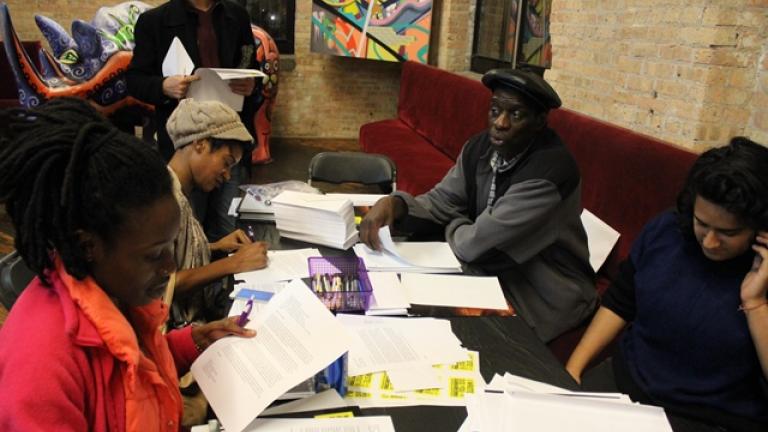Amnesty International is directing its attention to gun violence in Chicago and its human rights impact, while the Better Government Association investigates the cost of alleged police misconduct in Chicago and surrounding suburbs. Brandis Friedman has the details. Read Amnesty International's 10-Point Human Rights Agenda and the full BGA story below.
The Price of Police Misconduct
An in-depth look at the City of Chicago and Cook County suburbs finds thousands of lawsuits and hundreds of millions of dollars in payments to police-misconduct victims and attorneys.
By Andrew Schroedter
Better Government AssociationThe City of Chicago has spent more than a half-billion dollars on police-related legal claims over the past decade.
But the gut-wrenching payouts can’t all be blamed on notorious ex-Chicago Police Cmdr. Jon Burge, whose detectives elicited false confessions through torture.
Payments relating to the now-imprisoned Burge account for a fraction of the $521.3 million the city has spent on police-related settlements, judgments, legal fees and other costs since 2004, the Better Government Association has found.
The BGA also looked at what 132 Cook County suburbs paid for police misconduct-related claims and found a total of more than $42 million was spent over the last five years.
The true cost for both the city and suburbs, though, is even higher, as the BGA counted settlements and judgments, legal bills and other fees – but not less tangible expenses.
It’s important to note this isn’t just a financial issue.
Police misconduct has inflicted pain and suffering on numerous residents, and by the same token false allegations against officers also can exact a toll.
The numbers, however, speak for themselves.
In 2013 alone, the city shelled out $84.6 million – the largest annual payout in the decade analyzed by the BGA, and more than triple the $27.3 million the city had initially projected to spend last year.
A comparison to other major cities is difficult.
But the BGA found that New York City paid $151.9 million in the most recent fiscal year with figures available – more than Chicago has paid in any year since 2004. But New York’s population and police force is three times as large.
Los Angeles, which has a similar-sized police force as Chicago, paid nearly $20 million last year – the last time Chicago paid so little was $18.5 million in 2005.
Other BGA findings include:
+ More than 1,600 misconduct-related lawsuits had been filed against Chicago police from 2009 to 2013, a majority alleging excessive force. (An exact number for years 2004 to 2008 was not available.)
+ The city paid $391.5 million in settlements and judgments over the last decade. Nearly 15 percent, or $57 million, went to Burge victims.
+ Additionally, the city paid $49.8 million in plaintiff attorney fees and other costs related to all misconduct claims and an estimated $80 million for defense attorneys.
+ In the suburbs, more than a quarter of the misconduct lawsuits were concentrated in six towns: Berwyn, Calumet City, Cicero, Dolton, Harvey and Markham. Collectively, those suburbs have paid more than $23 million since 2008.
Political leaders in the city and suburbs say they’re working to address the problem.
But criminal justice experts tell the BGA that won’t happen, at least in Chicago, until police address a so-called “code of silence” – where officers refuse to tell on each other for misbehavior – and a flawed disciplinary system that together allow misconduct to prosper.
“Until that changes we’re going to continue to pay out money,” says University of Chicago law professor Craig Futterman, who has co-authored a report on Chicago police misconduct.
This story was written and reported by the BGA’s Andrew Schroedter, who can be reached at (312) 821-9035 or [email protected].
In the following web extra video, BGA Reporter Andrew Schroedter discusses the organization’s report on the cost of alleged police misconduct in Chicago and surrounding suburbs:
The following statements are from the Chicago Police Department in response to the two reports:
Amnesty International report:
"We continue to make progress in reducing crime and violence, driven by the Mayor’s comprehensive youth violence prevention strategy, which is more than policing alone. Our officers work hard every day to protect our communities, and they are being supported by our partnerships with other city departments and Chicago Public Schools to keep young people off the street and in school. All our programs – community policing, summer jobs, mentoring, after school activities, and restorative justice in schools – are contributing to historic declines in crime and youth violence. While Chicago continues to see historic lows in crime and violence, there is much more work to be done and we continue to be challenged by lax state and federal gun laws.
Chicago finished the first quarter of 2014 down 26 percent in shooting incidents, down 29 percent in shooting victims, down 9 percent in murders, and down 25 percent in overall crime incidents, compared to the first quarter of 2013. The first quarter of 2014 saw the fewest number of murders of any first quarter since 1958."
BGA:
"The Mayor and Superintendent have zero tolerance for any misconduct and have instituted a series of internal initiatives and reforms, to ensure past incidents of police misconduct are not repeated. CPD strengthened Internal Affairs, adding accountability measures to their work, adding more investigators, bringing Sergeants into investigations and giving IAD priority in selecting staff.
Additionally, CPD has worked to ensure we have the right supervisors in place, and provided new training that reflects the values we hold, not just as a department but as a community.
The actions of a small number of individuals that occurred years ago do not reflect the Chicago Police Department of today and the Superintendent and his team work with the community every day to ensure the public trust."



